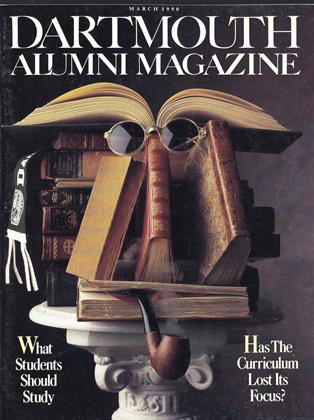IS THERE A SET OF FOUR SKILLS or books that determine a liberal education? Whitney Campbell Intern Catherine Stackhouse '90 asked some members of the Dartmouth family to give us their lists.
JORDY GREEN '90
Student Assembly President
1) Writing.
2) Love of reading.
3) Analytical skills (math and science).
4) Face-to-face communication. I also support the non-western requirement and see its strengthening as desirable. While western civilization has a lot to offer by bonding together many of us with a common heritage, it is equally important that a liberalarts curriculum stress the diversity of human achievement.
FAITH DUNNE
Professor of Education
I choose to focus on skills rather than on Four Key Books, because the notion that one can isolate four books essential to a liberal arts education has a Trivial Pursuit quality all too common in the academics debate. In an environment overwhelmed by information on an unprecedented range of topics, it is most important to arm young people with the skills that will allow them to sort the significant, the relevant, and the good and to teach them to apply those skills in a creative and legitimate fashion.
1) The ability to read effectively to evaluate data, to distinguish fact from opinion, to recognize the appropriate application of various kinds of data to various situations.
2) The ability to write effectively—to make a logical and coherent argument, backed by valid evidence.
3) The ability to see the connections among areas of learning to draw from multiple sources to build larger models of social, scientific, and aesthetic functions.
4) The capacity for moral reasoning to recognize and consider the effects of individual and group action on others.
5) The ability to learn cooperatively to work with others toward a common goal, finding and using resources in a collaborative rather than competitive manner.
JOHN KEMENY
President Emeritus
1) Ability to reason.
2) Ability to learn on your own you will have to learn for the rest of your life.
to details) of human knowledge.
4) Caring about fellow human beings.
SUSAN JANOSZ '78
National award-winning math teacher
A liberal-arts graduate should:
1) Be adept in problem solving.
2) Be flexible in any situation.
3) Possess a sense of how the U.S. fits into the world as a whole
4) Be adaptable to the quick pace of technological change.
DINESH D'SOUZA '81
Research Scholar, American Enterprise Institute
Every educated person in the U.S. should be exposed to a classic text of ancient Greece, Christianity, American founding, and of the essential American character. I recommend:
1) Homer's Iliad or Odyssey.
2) Dante's Divine Comedy or Milton's Paradise Lost.
3) The Federalist Papers by Hamilton, Madison, and Jay.
4) Huckleberry Finn by Mark Twain.
JAMES BREEDEN '56
Dean, Tucker Foundation
1) Ability to interpret all media critically.
2) The Bible.
3) An understanding of science and technology.
4) Mastery of at least one foreign language.
JOHN RASSIAS
Professor of French if Italian
Rather than submit a list of four books, I would prefer suggesting the collected wisdom of the whole work of an author or authors. Since I have to limit myself to four choices, I should like to cheat a little and offer a curriculum for my personal university that would include the following works:
1) The collected works of Aeschylus, Euripides, and Sophocles, or Greek mythology in dramatic form, bringing to life and interpreting what Wagner described as a "sonorous conch at the bottom of which could be heard stirring all of civilization." We define ourselves along mythological lines and behave by impulses described in epic tales.
2) Blaise Pascal, for wit, precision, and because to the unanswerable he replied, "The heart has its reasons."
3) Denis Diderot, for un-re- strained, sweeping, cyclonic imagination.
4) Nikos Kazantzakis, for unbridled passion, lack of moderation or, as he put it, "Excess in all things," and for a practical definition of life as a neverceasing upward struggle to transform matter into spirit.
JamesBreeden
 View Full Issue
View Full Issue
More From This Issue
-
 Cover Story
Cover StoryDartmouth's Steady Course
March 1990 By James Wright -
 Feature
FeatureA Hero to Europe
March 1990 -
 Feature
FeatureADDICTED TO CONVERSATION
March 1990 By Clayton G. Gates '90 -
 Feature
FeatureANCIENT PAGE TURNERS
March 1990 By JONI COLE AND LEE MICHAELIDES -
 Feature
FeatureThe Purpose Gap
March 1990 -
 Feature
FeatureAn Elegant Backwater
March 1990 By Clayton G. Gates '90
Article
-
 Article
ArticleAlumni Articles
November 1973 -
 Article
ArticleWHICH GRADUATION TION REQUIREMENT WOULD YOU MOST LIKE ELIMINATED?
SEPTEMBER 1991 -
 Article
ArticleDartmouth 7, New Hampshire 6
November 1960 By DAVE ORR '57 -
 Article
ArticleLACROSSE
JUNE 1964 By DAVE ORR '57 -
 Article
ArticleWE ASKED 300 STUDENTS:
December 1994 By Peter R. Barnes '98 -
 Article
ArticleThe Annual Regatta
SEPTEMBER 1997 By Rick Van Mell '63


